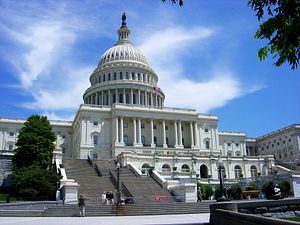U.S. Representative Mike Gallagher, who chairs the House Select Committee on China, recently led a bipartisan delegation of committee members to Taiwan. During a meeting with Taiwan’s President-elect Lai Ching-te, Gallagher highlighted a sports analogy Lai had previously used: “If we play a one-on-one game [with China], we could lose, but if we play as a team, there’s no way that we can lose.”
Gallagher’s message not only reaffirmed U.S. support for the self-governed democracy in face of growing aggression from neighboring China, but it recognized Taiwan as a critical “team player” for the United States in its strategic competition with China – the key focus of the committee that Gallagher chairs.
In this consequential strategic competition, Taiwan’s extensive experience in combating the Chinese Communist Party’s economic statecraft, military and cyber threats, and influence operations, among other gray-zone tactics taken directly out of the party’s authoritarian playbook, provides invaluable insight for Congress and the American public. It is imperative that the House China Committee convene a hearing on Taiwan.
The House Select Committee on the Strategic Competition between the U.S. and the CCP (as it is formally known) was introduced by former House Speaker Kevin McCarthy in the current Congress to “expose and fight against the CCP’s cyber, trade, and military threats against America.”
Under the bipartisan leadership of Gallagher, a Republican, and ranking member Raja Krishnamoorthi, a Democrat, the committee has conducted a series of hearings and investigations to explore everything from Beijing’s human rights violations to how its military and economic capabilities can be mobilized to threaten U.S. interests and national security.
The issue of Taiwan, especially the prospect of a 2027 conflict with China, has been an underlying thread to many of the committee’s hearings, albeit never as a standalone topic. Most recently, Cybersecurity and Infrastructure Security Agency (CISA) Director Jen Easterly warned the committee how China could launch massive cyber attacks against U.S. critical infrastructure to induce panic and deter action in the event of a Chinese invasion of Taiwan.
Similarly, the committee took part in a tabletop war game that simulated a 2027 Chinese invasion of Taiwan in which the United States responded with military and economic measures. Neither China nor the U.S. achieved a decisive victory in that simulation.
The tabletop exercise and testimonies highlight not only how the United States should respond in a conflict over Taiwan, but, more importantly, how Washington plans to deter China through an integrated approach that utilizes all elements of U.S. national power: economic, military, informational, and diplomatic.
However, as former Secretary of State Mike Pompeo testified before the committee, “deterrence is always temporary” and relative to the capabilities of adversaries. Credible deterrence would thus require an accurate measure of China’s national power and a clear-eyed view of its operations in action. This is where Taiwan can help.
Beijing’s economic sanctions toward Taiwan have become standard procedure whenever the CCP wants to demonstrate its displeasure. Ahead of Taiwan’s recent presidential election on January 13, China threatened to terminate an economic framework that waived tariffs for over 800 Taiwanese products; this was widely viewed as election interference.
In addition to the weaponization of trade, China also launched unprecedented military drills in the airspace and waters around Taiwan after former U.S. House Speaker Nancy Pelosi’s visit in August 2022. Japan’s Yomiuri Shimbun recently reported that four Chinese warships have since been constantly deployed around Taiwan, likely part of a contingency to encircle the island, cut off foreign aid, and disrupt supply chains at any time it chooses.
On the cyber front, U.S.-based cybersecurity firm Trellix found that attacks on Taiwanese organizations more than doubled in the 24-hour period before Taiwan’s recent presidential election. The report also called attention to Beijing’s goal of manipulating public opinion in a foreign state to achieve electoral outcomes it finds favorable.
Chinese influence campaigns have increasingly disseminated “America skepticism” through Taiwan’s media, promoting narratives that portray the United States as an unreliable partner. The immense popularity of Chinese-owned social media platforms Douyin – run by TikTok parent company ByteDance – and Xiaohongshu among Taiwan’s younger generations have also raised national security concerns.
Taiwan has lost 10 of its diplomatic allies since 2016, as Beijing continues to coerce countries to switch recognition through carrot-and-stick tactics, leveraging access to its markets as a bargaining tool. China employs the same coercive strategies in bids to expand its influence in the Indo-Pacific and beyond.
The question of why Taiwan matters to the United States has been scrutinized from strategic, economic, and normative perspectives. There is now overwhelming consensus in policy circles and public opinion alike on Taiwan’s significance. The question of how Taiwan’s experience with China is relevant to the U.S., especially in an election year closely monitored and likely targeted by Beijing, has received less attention.
Taiwan’s experience in facing China is critical to the development of effective strategies to counter Chinese aggression. Not only can policymakers draw upon Taiwan’s lessons learned, it is imperative that the American public be provided with a clear-eyed view of Chinese capabilities and the threat they constitute.
There is no better setting than a hearing in the House China Committee to hear from Taiwan, a fellow member on team democracy.

































